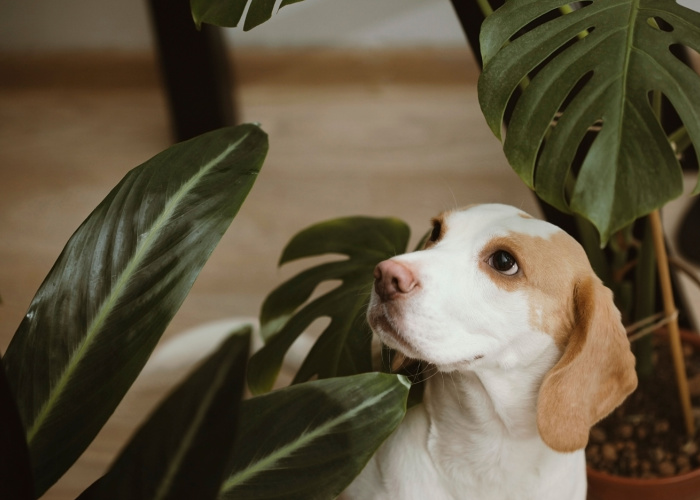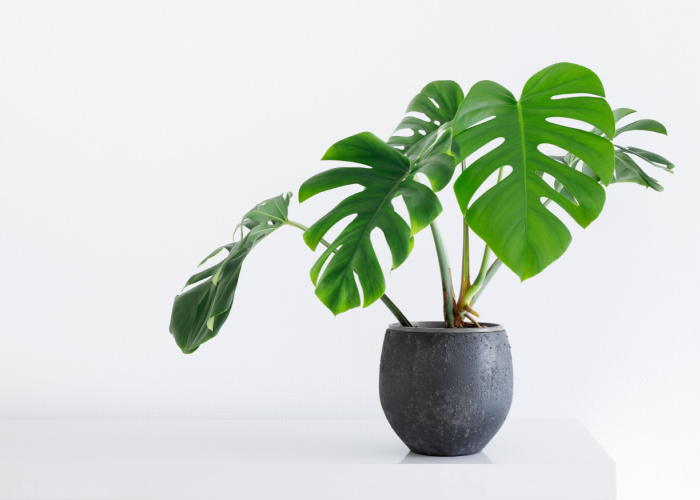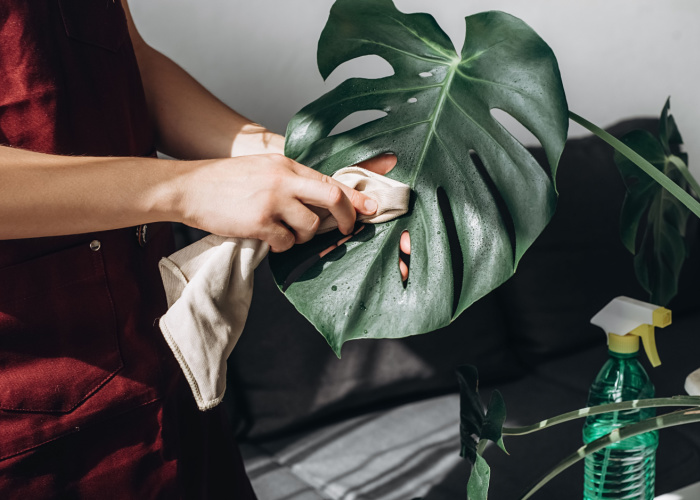
Table of Contents
Pet owners who are also plant lovers should know that certain plants can be toxic to pets.
So you might be wondering… Are Monsteras toxic to dogs?
Well, the question doesn't really have a ‘yes or no' answer.
Monstera, also known as Swiss-Cheese, is an easy-to-grow plant that can be a great choice for gardeners since it can quickly adapt to any indoor environment.
However, if you own pets, that can be a problem.
As pet owners, we must consider the potential side effects it can have on your dog.
We all know that dogs are naturally curious animals, right?
They can get a little too curious sometimes and eat something they shouldn't.
Seeing something new piques their interest; they might smell or lick and eat it.
This blog will discuss everything you need to know about if Monsteras are toxic to dogs.
Below, we'll tackle whether Monsteras are toxic or poisonous (yes, they are different) to dogs.
Without further ado, let's get right into it!

Are Monsteras Toxic to Dogs?
If you're wondering if Monsteras are toxic to dogs, you might want to sit down first.
You'd think it would be a straight ‘yes or no' answer to the question, but it really isn't.
The genus Monstera is a popular houseplant that the ASPCA lists as toxic for dogs and cats.
Plenty of plants are deemed toxic since they are very dangerous and can even fatally harm our pets.
However, Monstera are only “mildly toxic”, meaning they can still cause negative side effects but do not contain toxins that can cause life-threatening situations like organ failure.
When ingested, Monstera can cause multiple issues, such as tongue and throat pain and even an intestinal upset.
But it can be debated that ‘toxic' isn't the correct term.
The plant is mainly branded as toxic because its parts (stems, leaves, roots, and unripe fruit) contain calcium oxalate crystals.
What Is Calcium Oxalate?
If you look at the ASPCA list of toxic plants, almost all of the plants in that section contain calcium oxalate.
So, what even are calcium oxalate crystals?
Calcium oxalate crystals can irritate the mouth and stomach when eaten.
If your dog or cat accidentally nibbles on a Monstera, it might have an unpleasant or painful time.
But the silver lining here is even if your pet shows signs of pain and irritation after eating this plant, they should be able to recover.
However, we still must monitor our pets for uncommon swelling reactions.
This Swiss cheese plant is regarded as toxic but not poisonous.
But what exactly is the difference between the two?
The Difference Between Toxic And Poisonous
There is still confusion about the terms ‘poisonous' and ‘toxic'.
These days, we habitually mix up terms that mean very different things. Such is the case with poisonous and toxic.
So, what are the differences between these two?
According to the Oxford Dictionary, poisonous is “causing death or illness if swallowed or absorbed into the body.”
Poisons are any chemical substances that affect biological functions in organisms. For instance, substances like bleach can cause physical harm to our skin and can be deadly if swallowed.
On the other hand, toxins are defined as biologically produced chemical substances or poisons that affect biological functions in organisms.
To summarise, plants or animals considered poisonous contain or secrete poisonous substances. But when it's toxic, it contains biologically produced poisonous substances.
All toxic plants are poisonous, but not all poisonous plants are toxic.
So, yes, Monsteras are considered toxic since they contain biologically produced substances called calcium oxalate, but it is not labelled as poisonous since they don't secrete toxins (unlike poison ivy).

Could Monsteras Kill My Dog?
In almost all cases, Monsteras can't kill a dog unless consumed in very large amounts.
Large quantities of calcium oxalate crystals can cause kidney damage.
However, this situation is rare since these crystals can cause immediate irritation, discouraging the dog from eating more of the toxic plant.
But it is still best to consult your vet immediately if your dog has ingested something he shouldn't have.
What to do if your dog eats Monstera plant
If you're dog accidentally ate a monstera plant, the first thing you need to do is not panic. Dogs can sense when we are anxious or scared.
Everything will be alright. Just follow the guide below to ensure your dog's safety.
- Remove access to the Monstera plant
- Check the inside of your dog's mouth
- Check for redness or swelling
- Offer water if you notice that your dog is irritated or in pain, as it can wash the crystals from the mouth
- If your pet is still suffering after these steps, consult with your vet right away to avoid swelling or blockage
- Vets can prescribe or administer proper painkillers or additional treatment if necessary
Symptoms of Monstera Toxicity in Dogs
Symptoms of Monstera toxicity in dogs can show immediately after a dog ingests the plant. It can show within the first 30 seconds or take up to 24-36 hours.
Even though the first symptoms are not fatal, they can gradually become worse and scarier.
Below, we've compiled a short list of the signs of monstera toxicity in dogs.
- Nausea
- Loss of appetite
- Diarrhea
- Pain or burning on the dog's lips, mouth, or tongue
- Irritation on the dog's lips, mouth, tongue, or throat
- Excessive drooling
- Vomiting
- Rubbing their mouth
- Difficulty swallowing
Side effects connected with Monstera poisoning can last a few days or weeks. However, this will depend on how much plant your dog ate and their size.
Since these symptoms will vary, monitoring your pup closely is best advised. Take notes on when they last ate, drank, or used the bathroom.
If Fido hasn't eaten, drunk, or used the bathroom for over 24 hours, take him to the vet instantly.
First Aid/ Treatment to Monstera Toxicity
If your dog has consumed a Monstera plant, contact your vet immediately. It's better to be safe than sorry!
Taking him to the vet as a precaution can help ensure they are safe and get the proper treatment they need.
Vets can administer pain relievers or other treatments if necessary.
We recommend rinsing your dog's mouth, eyes, paws or any body part that has come in contact with the plant with clean water.
Encourage Fido to drink lots of water to help eliminate as many crystals as possible from their digestive system.

How to Prevent Your Dog From Eating a Monstera Plant
Prevention is still better than cure.
And for all you plant lovers out there, you can still grow a Monstera plant at home with your dog or cat.
Here are a few easy precautions to help prevent your dog from eating a monstera plant:
Keep the Monstera out of reach
This one is a no-brainer.
Of course, keep the plant away to where your dog or cat cannot reach. Place the plant on a high shelf or hang it outside, for example.
If you have an excess room, you can place the Monstera there.
Some pet owners have a specific room in their house where they don't allow their dogs in.
Depending on your house or where you live, you can also consider moving your Monstera to live outside.
Train your pets to stay away
Training your dog using positive reinforcement or reward-based methods can help your pet avoid the plants.
Teach them to steer clear of any other plants or other foreign objects that can potentially harm them.
Use Noise or Smell Deterrents
You can also use safe deterrents to help keep your dogs away from the Monstera.
For instance, you can use loud noises since many dogs fear loud noises. However, noise deterrents can bother other people in the house or your neighbors.
Fortunately, you can also try using smell deterrents.
As you know, dogs have a higher sense of smell than humans. Use this to your advantage!
You can spray the Monstera plant with chilli peppers, vinegar, and other strong smells that dogs don't like to keep them at bay.
Get plants that are safe for pets
Well, you can also switch it up by getting pet-friendly plants instead.
Consider replacing any other toxic plants that you might have in your home.
That way, even if your dog munchs on these plants, they will not experience any bad or life-threatening side effects.
Safe Plant Alternatives for Dogs
If you've decided to eliminate all the toxic plants in your home, you'll need replacements.
Below, we've gathered a short list of beautiful yet easy-to-care-for plants that are safe for pets:
- Rattlesnake Plant
- Spider Plant
- Parlor Palm
- Calathea Orbifolia
- Ponytail Palm
- African Violet
- Bird's Nest Fern
- Boston fern
- Burro's tail
- Christmas cactus
- Majesty palm
- Money tree
- Nerve plant
- Prayer plant
Other Unsafe Plants for Dogs
If you plan to pick up gardening, there are still plenty of unsafe plants for pets that you should keep in mind.
Some plants are not just toxic to pets but can also harm children.
Here are a few of the other toxic houseplants that you need to know:
- Lilies
- Aloe Vera
- Chrysanthemum
- English Ivy
- Dragon tree
- Alocasia
- Jade
- Dumb Cane
- Elephant Ear
- ZZ Plant
- Sowbread

Frequently Asked Questions
What happens if a dog eats Monstera?
If your dog ingests a monstera plant, it will irritate their mouth, throat, and stomach. It can also cause vomiting and excessive drooling.
Luckily, Fido's life is not at risk as long he has not eaten very large amounts of the plant.
What happens if a dog licks a toxic plant?
Dogs are very curious animals, and if you suspect your dog has got into a toxic plant, they may show poisoning signs such as vomiting, loss of appetite, lethargy, excessive drooling, or coughing.
Does Monstera need sun?
Monstera is a great houseplant since it can grow just about anywhere. It can tolerate low light but grow faster in a spot with indirect bright light.
Avoid putting them in spots with direct sunlight, as it can cause the leaves to burn.
Are Monsteras Toxic to Dogs? Before You Go…
If you know your dog has eaten something he wasn't supposed to, it's best to contact your vet. Your vet will know and can talk you through what to do in this situation.
Swiss-Cheese, or Monstera, is a beautiful tropical houseplant that can adapt quickly to any indoor environment.
So, are Monsteras toxic to dogs?
Yes, Monsteras are toxic to dogs since almost all their parts contain Calcium Oxalate Crystals. These crystals are made of oxalate and calcium that are sharp and rough, like a cluster of needles.
These crystals irritate a dog's mouth, throat, and digestive system. So if your dog or cat ingests a Monsteras plant, they probably won't have a good time and can even cause pain.
As pet owners, we must know about things that can harm our dogs. It's best to keep these plants away from your pets and children.
Wanna learn more about dogs and plants? Check out our other articles about this below!












